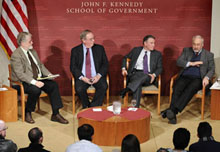
November 19, 2008 — The United States needs to update financial regulation to acknowledge the global economy of the 21st century in order to prevent today’s global financial crisis from happening again, according to a panel of financial experts.
The future of U.S. economic regulation was discussed in the Nov. 19, 2008, John F. Kennedy, Jr., Forum panel discussion, “Financial Re-Regulation: The Economics and the Politics.”
- Watch the Video
The event was moderated by Harvard Kennedy School lecturer in public policy Richard Parker, with panelists Joseph Stiglitz, Columbia University professor; Robert Dugger, managing director, Tudor Investments Corporation; and Jack Blum, counsel, Baker & Hostetler, LLP, and former United States Senate staff attorney.
The panel began by discussing recent G20 meetings among world leaders where lack of transparency was identified as a key problem in financial markets. The Forum panel did recognize transparency as an important issue, but said there are also many other issues to address including incentives for corporations increasing their stock-value, excessive risk taking and bad accounting practices.
The panel agreed one of the big issues that lead to the financial crisis were the complicated and unregulated “derivatives.” Derivatives are financial instruments whose value derive from the performance of an underlying asset, such as a stock, bond, market index, or loan.
“It was clear that [derivatives] were very dangerous,” said Stiglitz. “But the response of Greeenspan, our secretary of treasury, basically all the deregulators, was ‘Yes, they’re dangerous, but to regulate was more dangerous’. They said it would stifle innovation.”
Another issue is that many investors kept the “garbage” investments such as subprime mortgages in offshore accounts avoiding taxes and, more importantly, the eyes of United States’ regulatory agencies.
“You cannot have a global, seamless financial system when you have banks that are governed and regulated nationally, but doing business globally,” said Blum.
The panelists agreed that any new regulation needed to acknowledge the international nature of investments: Companies should not be allowed to invest in any country with an absence of financial parameters similar to those in the United States.
Dugger said people have lost faith in the American financial system, and the next presidential administration needs to work towards restoring that faith.
“The core element to get this society — to get this economy — working effectively is to restore trust,” said Dugger. “And that means the economy has to be focused on the lifetime well-being of every American. It has to be focused long-term, there has to be ample transparency, and an enormous respect for truth.”
This article was written by Jake Ackman of the Harvard Kennedy School. The original article is here.

